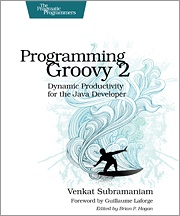Are you familiar with Groovy? Do you know how to use it? Perhaps you should.
“Groovy” is flexible, highly productive, agile, dynamic language that runs on the rich framework of the Java Platform. Groovy preserves the Java semantics and extends the JDK to give you true dynamic language capabilities.
“Programming Groovy, 2nd Edition” from Pragmatic Bookshelf is an US$35, 350-page guide to help the experienced Java developer, learn and take advantage of the latest version of this rich dynamic language. You’ll go from the basics of Groovy to the latest advances in the language, including options for type checking, tail-call and memoization optimizations, compile time metaprogramming, and fluent interfaces to create DSLs.
You don’t have to leave the Java Platform to take advantage of Groovy. Groovy preserves Java’s semantics and extends the JDK, so programming in Groovy feels like the Java language has been augmented; it’s like working with a lighter, more elegant Java. If you’re an experienced Java developer who wants to learn how Groovy works, “Programming Groovy, 2nd Edition” is worth a look.
You’ll start with the fundamentals of programming in Groovy and how it works with Java, Then you’ll explore advanced concepts such as unit testing with mock objects, using Builders, working with databases and XML, and creating DSLs. You’ll master Groovy’s run-time and compile-time metaprogramming features.
For more information about the book, including: code, errata, full table of contents, excerpts from the book and more, go to http://tinyurl.com/nxfsvsb .




